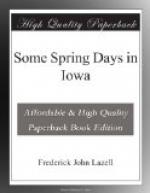"The
busy day
Wak’d by the lark, hath
roused the ribald crows."
Then came the liquid notes of the cowbirds, like the pouring of mingled molasses and olive oil. Three handsome fellows in ebony and dark brown sit on the branch of a tall elm and just beneath them sit three brownish gray females, all in a row. Cowbird No. 1 comes nearer the end of the branch, ruffles out his head as if he were about to have a sick spell and then emits that famous molasses and oil kind of whistle, sufficient to identify the cowbird anywhere. The other males repeat his example and meanwhile the females look on with approving eyes, as if it was a vaudeville performance by amateurs in polite society. The cowbirds, male and female, are all free lovers. There is no mating among them. The female lays her eggs in some other bird’s nest, like the English cuckoo, as if she were too busy with the duties and pleasures of society to care for her own children.
A diskcissel[TN-4] sits on a tree instead of a reed or a bush as usual and sings “See, see, Dick Cissel, Cissel.” Chewinks are down scratching among the dry leaves with the white-throated sparrows, their strong-muscled legs sending the leaves flying as if a barnyard hen were doing the scratching. A beautiful hermit thrush is near but he is silent. The chewink in his harlequin suit of black, white, and chestnut varies his sharp and cheerful “Chewink” with a musical little strain, “Do-fah, fah-fah-fah-fah,” and one of the white-throated sparrows now and then stops feeding and flies up to a hazel twig to give his sweet and plaintive little “pea-a-body, peabody, peabody.” Very pretty, but not so beautiful as the three broad white stripes on his crown and the white choker under his chin.
Suddenly a brown thrasher breaks into a melody from the top of a wild cherry, and then it is as if a famous operatic coloratura soprano had joined the village choir. For power and continuity of song he is without a peer. With head erect and long tail pendant he pours forth such a flood of melody, so varied and so sweet that we forget the exquisite hymn-like notes of the wood-thrush and yield ourselves wholly to the spell of his rich recital. Make the most of it while it lasts. Like all the glories of the May woods it is evanescent. When the nest down in the brush is finished, and his mate “feels the eggs beneath her wings,” his song will grow less full and rich and by the time the young birds come he will have grown silent, as if weighed down with the responsibilities of a family.
We get too near the thrasher for his liking and he slips down into the brush. And then, by rare good fortune, a blue-bird begins his song. He has been chided by some because he has a magnificent contralto voice and scarcely ever uses it. Have we not been taught to chide the man who hides his talent in a napkin, or his light under a bushel? But how he can sing when he does sing! This is one of the mornings. The rich contralto thrush-like melody, with its ever recurring “sol-la,” “sol-la,” fills the woodlands with beauty. It is as if the pearly gates had been opened for a brief interval to let the earth hear the “quiring of the young-eyed cherubims.”




